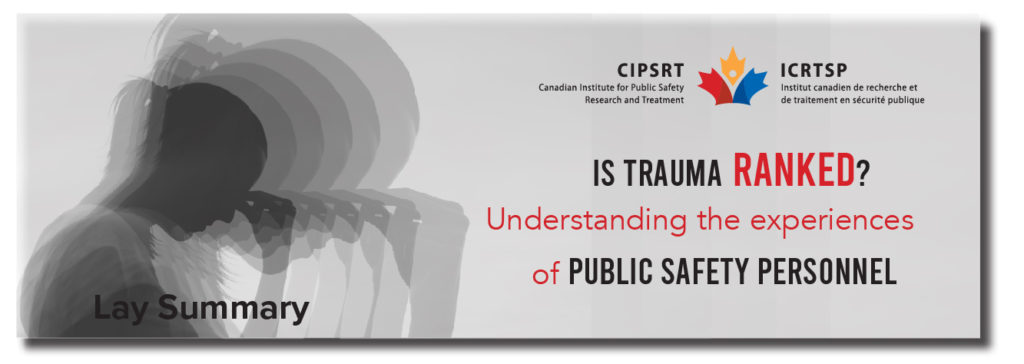Research Summaries

Why was the study done?
In the course of their work, Public Safety Personnel (PSP) are exposed to more potentially traumatic events (PTEs) than the general population. Trauma exposure can be direct (e.g., police-involved shootings) or indirect (interviewing victims) and beyond critical incidents (e.g. road disasters, deaths) an accumulation of smaller indirect events can also lead to mental health issues. However, a critical barrier to PSP receiving help might be an organizational culture that believes that only direct exposures to trauma affect mental health. A ranking system of trauma might exist among PSP that could affect how they view the legitimacy of mental health issues and treatment-seeking behaviour. The goal of this study was to see how PSP viewed different PTEs and how ‘eligibility’ for being traumatized is determined by PSP.
What was done in the study?
PSP, recruited through their employers, organizations, or public announcements, participated in an online survey that assessed mental health symptoms and invited open-ended feedback. PSP were asked to report about their most traumatic incident/ event experience using the Life Events Checklist. If the event was not one of the options offered or they wanted to provide more context, there was the option of open-ended feedback; 284 participants (110 female; 170 male) offered such feedback, which was analyzed in this study.
What did the study find?
- A ranking system exists within the PSP community based on how trauma is experienced with direct exposure to PTEs being considered more traumatic than indirect exposure.
- Participants reported that they expected mental suffering had to be proportional to the level of interpreted trauma, regardless of how the individual might have been affected by the event. For example, those who had been involved directly on the scene would be impacted more than those that read the report, regardless of the individual’s previous experiences.
- Suffering from a less traumatic event (e.g., indirect, accumulated trauma), despite its actual affect, was culturally less legitimate.
- Seeking support and treatment for direct exposure to PTEs was seen as always warranted while seeking it for lesser-ranked trauma was not.
- The experiences of communications officials might not be understood as being PTEs because they often experience the trauma indirectly.
- Many PSP feel that their trauma-related suffering is taken most seriously only if it is reported and addressed within a certain period of time.
Where do we go from here?
More research needs to be done to better understand how PSP experience and thus rank different types of trauma (direct vs. indirect), and how they determine whether their peers can legitimately claim to be traumatized. However, the authors make the case that PSP would benefit from more education about the legitimate basis for trauma following all types of trauma. All PSP should feel empowered to seek assistance without the threat of stigma, regardless of the types of trauma they have experienced.
The original wording of the study was changed and condensed for the current lay summary.
For more information about this research contact: CIPSRT@cipsrt-icrtsp.ca
Original Article: Ricciardelli, R., Czarnuch, S., Afifi, T.O., & Carleton, R.N. (2020). Public Safety Personnel’s interpretations of potentially traumatic events. Occupational Medicine. https://doi.org/10.1093/occmed/kqaa007
Lay Summary prepared by Kossick, E., Reviewed by: Martin, R. & Ricciardelli, R., 2020